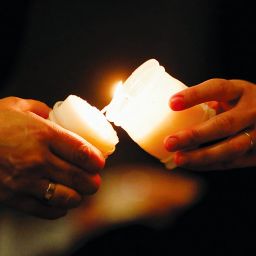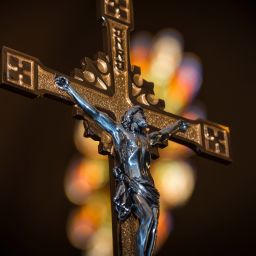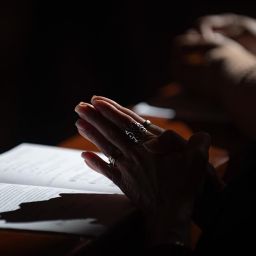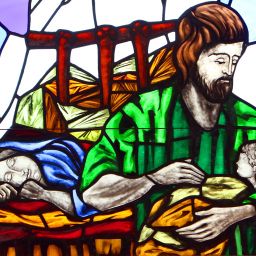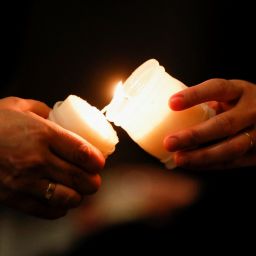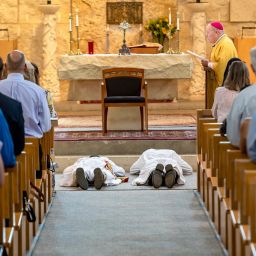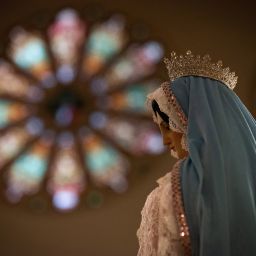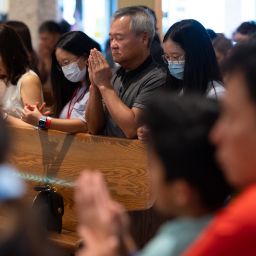
By Father John Bayer, O. Cist.
Special to The Texas Catholic
In my last column, I reflected on the beautiful witness offered by children who were miscarried or stillborn. Now, I’d like to reflect on their parents.
Mothers are gifted by God with unique insight into the mystery of life and its connection, for now, to the tragedy of death. Just think of Mary. Her maternity extended from Bethlehem to Calvary: to be a mother as God desires, Mary had to give life to a person destined to pass through death. Her fiat or “yes” to life at the Annunciation is not merely biological; it is a cooperation with God’s whole Providence for the one she births. That means that an ‘openness to life’ is at the same time a certain openness to death, and thus, for now, the joy of motherhood is always accompanied by pain (Gn 3:16; Jn 16:21).
I imagine the pain a mother suffers is especially acute when her child dies within her own body through miscarriage or stillbirth. Her pain can be physical, like labor. It can also be psychological, for she might be alone when she first realizes what is happening, and she might experience the loss of her child as a challenge to her identity as a mother: for a mother wants her body – herself – to be safe and nourishing. We must pray for mothers in such vulnerable moments. I feel out of my depth here, but I wonder what temptations sinless Mary batted away as she watched her child die at Calvary. I suspect the devil tried to get her to doubt God’s goodness, as he tried with Eve. As a twisted angel, he probably twisted the angel Gabriel’s words: “See? What a trick God played on you, for in the end you did not really conceive and bear a son, now did you?” (cf. Lk 1:31; Gn 3:1-5). Mary knew her motherhood is a mystery rooted in God, and that she is truly the mother God desires – that she will give birth to someone who will pass through death and thereby defeat it. God wants the same for every Christian mother who bears children for him, who offers herself to him so that he might generate souls to share in the mystery of his Son’s Passion and Resurrection. Ultimately, the threat posed by her child’s death to her identity as a mother only reveals the marvelous nobility of her maternity – for, like Mary, she cooperates with God to bear souls for eternal life.
The solitude of a mother before death is paralleled by the solitude of a father. It is fascinating to consider St. Joseph’s absence from Calvary. How much he – like any husband, ultimately – would have wanted to be there, but God’s Providence ordained otherwise. Even if a husband’s circumstances allow for his physical presence, he cannot fully reach his wife in her primal and intimate conversation with God. At the premature death of their child, a husband suffers a double pain: the pain of losing a child, and the pain of seeing the woman he loves experience so acutely a challenge to her identity as a mother. In that moment, he sees his powers as a husband and father are not unlimited – that he cannot with his own power give his wife children and protect them. But in this weakness, he too can discover his dignity by recognizing that his fatherhood is but a share in God’s own, and that the love and life he generates is destined for eternity.
When fathers and mothers grasp that our human fragility extends also to their children, there can be tremendous pain. For such weaknesses threaten their identities as men and women marvelously ordered to life and joy. They want more than anything to see their children healthy and happy, and there is perhaps no greater pain than to think they are unable to help them, or that they are in any way connected to their suffering. But this pain reveals a marvelous truth. When mothers and fathers see their limits, they glimpse the unlimited power of the one from whom all generation, life and family come (cf. Eph 3:14-15). Faithful women and men who experience loss have a tremendous gift to offer us all. For, they witness to a marvelous mystery: God promises to overcome sin and death, and thereby he underwrites, so to speak, our motherhood and fatherhood. For while we may be tempted to think we are failures, a death such as a still-birth is, in a mystical way, a still–alive-birth under God: little children are real children, even if they are already with God waiting for us. They have come into this world, even if they left it prematurely to await their resurrection with the rest of the deceased. Their parents are true parents, and their siblings are true siblings, for whether a child lives but a moment or a lifetime, the relationships that define them as images of God are established, and in Jesus we have every reason to hope that they will live forever.
If you or parents you know are suffering the premature death of a child, know that there are ministries and resources, such as Mary’s Mantle ([email protected]) and those listed on the websites of the Catholic Pro-Life Community and Natural Womanhood.
Father John Bayer, O. Cist., is a monk at the Cistercian Abbey of Our Lady of Dallas in Irving.


